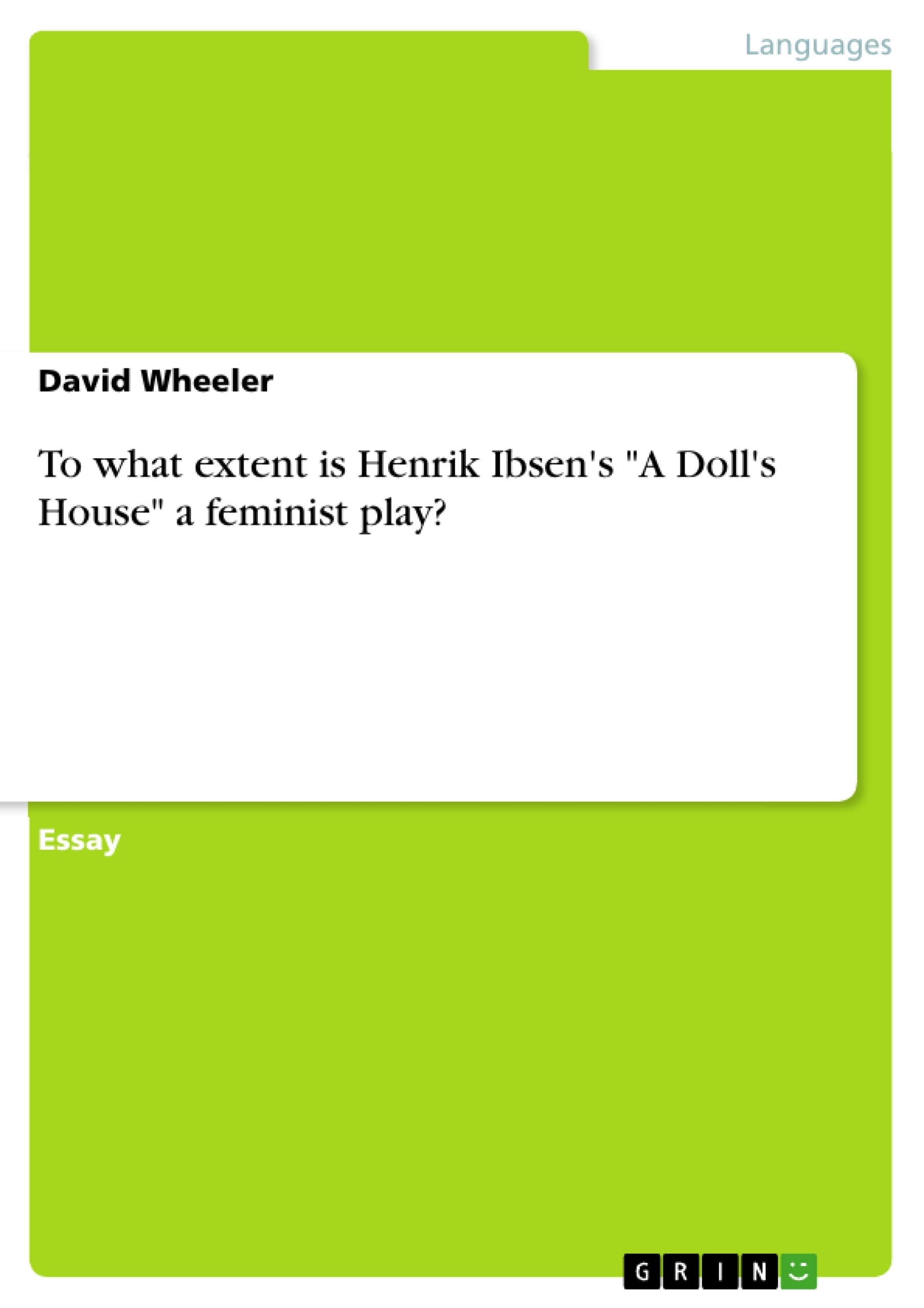A discussion of the ongoing impact of 'A Doll's House' on the movement for women's suffrage/feminism.
Table of Contents
- Introduction
- Ibsen's A Doll's House: Feminist Play or Not?
- Critical Perspectives
- Historical Context and Social Impact
- The Helmers' Marriage: Deception and Lies
Objectives and Key Themes
This research paper aims to analyze whether Henrik Ibsen's A Doll's House can be considered a feminist play. It will achieve this by examining diverse critical interpretations and exploring the play's historical context and performance history. The analysis will avoid prematurely drawing conclusions, instead offering a comprehensive overview of the debate.
- The feminist interpretations of A Doll's House and counterarguments.
- The role of deception and societal expectations in shaping Nora's actions and her marriage.
- The historical context of 19th-century patriarchal society and its influence on the play's themes.
- The impact of A Doll's House on societal attitudes towards women's rights.
- Nora's journey of self-discovery and her eventual departure from her marriage.
Chapter Summaries
Introduction: This introductory section establishes the central question of whether Ibsen's A Doll's House is a feminist play, acknowledging the ongoing debate among critics. It previews the methodology, outlining the examination of critical viewpoints and the play's performance history to offer a nuanced perspective.
Ibsen's A Doll's House: Feminist Play or Not?: This section delves into the core argument, exploring Nora's actions—specifically her abandonment of her husband and children—as a potential rebellion against patriarchal norms. The anachronistic nature of applying "feminist" to a play written before the feminist movement's emergence is addressed, acknowledging the complexities of interpreting the play through a modern lens.
Critical Perspectives: This chapter presents conflicting interpretations of the play. Some critics argue that A Doll's House transcends gender, focusing on themes of individual self-discovery. Others contend that Nora's gender is central, highlighting the play's critique of societal constraints on women. The chapter analyzes these contrasting viewpoints, presenting evidence from various critics to demonstrate the range of interpretations.
Historical Context and Social Impact: This section examines the socio-political context of 19th-century Norway, highlighting the limited rights and opportunities available to women at the time. It explores how Nora's actions reflect the realities of a patriarchal society, emphasizing the constraints placed upon her. The section also analyzes the play's impact on subsequent social changes concerning women's rights in Norway and beyond.
The Helmers' Marriage: Deception and Lies: This chapter analyzes the dynamics of Nora and Torvald's marriage, focusing on the pervasive theme of deception. It highlights Torvald's controlling behavior and infantilization of Nora, contrasting it with her capacity for independent thought and action. The analysis delves into the various forms of deception—Nora's financial secrets, Torvald's emotional manipulation—and their contribution to the marital breakdown. The chapter also examines the significance of Torvald's reaction to Nora's confession, leading to Nora's epiphany and departure.
Keywords
Feminism, patriarchy, gender roles, deception, self-discovery, individual freedom, societal constraints, marriage, 19th-century Norway, Henrik Ibsen, A Doll's House, Nora Helmer, Torvald Helmer.
Frequently Asked Questions: A Doll's House - Feminist Play or Not?
What is the purpose of this document?
This document provides a comprehensive overview of Henrik Ibsen's A Doll's House, examining whether it can be considered a feminist play. It includes a table of contents, objectives, key themes, chapter summaries, and keywords, offering a structured analysis suitable for academic use.
What are the key themes explored in the analysis of A Doll's House?
The analysis explores several key themes, including feminism and patriarchy; gender roles and societal expectations; deception and manipulation within marriage; Nora's journey of self-discovery and individual freedom; and the historical context of 19th-century Norway and its influence on the play's themes. The conflicting interpretations of the play's feminist nature are also a central theme.
What is the main research question addressed in this document?
The central question is whether Ibsen's A Doll's House can be considered a feminist play. The analysis avoids a simple yes or no answer, instead exploring the complex debate surrounding this question.
How does the analysis approach the question of A Doll's House's feminist nature?
The analysis takes a multi-faceted approach. It examines various critical perspectives on the play, considering both arguments for and against its feminist interpretation. It also explores the historical context of 19th-century Norway and the play's impact on subsequent societal changes regarding women's rights. The analysis also considers the complexities of applying a modern feminist lens to a play written before the emergence of the feminist movement.
What are the key chapters and their respective focuses?
The document is structured into chapters covering an introduction, a deep dive into the play's feminist interpretations (or lack thereof), an exploration of different critical perspectives on the play, an analysis of the historical context and social impact of the play, and finally, a detailed examination of the Helmers' marriage, focusing on the role of deception and its consequences.
What are some of the critical perspectives discussed regarding A Doll's House?
The document presents conflicting interpretations. Some critics argue the play transcends gender, emphasizing individual self-discovery. Others focus on Nora's gender, highlighting the play's critique of societal constraints on women. The document presents evidence from various critics to showcase this range of interpretations.
What is the significance of the Helmers' marriage in the analysis?
The Helmers' marriage is analyzed in detail, focusing on the pervasive theme of deception and manipulation. The analysis explores Torvald's controlling behavior and Nora's capacity for independent thought and action. It also examines the various forms of deception and their contribution to the marital breakdown, ultimately leading to Nora's epiphany and departure.
What keywords are associated with this analysis of A Doll's House?
Keywords include: Feminism, patriarchy, gender roles, deception, self-discovery, individual freedom, societal constraints, marriage, 19th-century Norway, Henrik Ibsen, A Doll's House, Nora Helmer, Torvald Helmer.
- Quote paper
- David Wheeler (Author), 2011, To what extent is Henrik Ibsen's "A Doll's House" a feminist play?, Munich, GRIN Verlag, https://www.grin.com/document/176214




